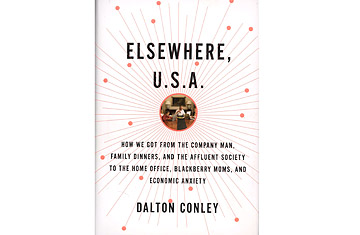
Elsewhere, U.S.A.: How We Got From the Company Man, Family Dinners, and the Affluent Society to the Home Office, Blackberry Moms, and Economic Anxiety
By Dalton Conley
Pantheon; 221 pages
The Gist:
It's pretty much all there in the subtitle. Conley, a New York University sociologist, asks why middle- to upper-class professionals who were once able to put in a full day's work at the office, enjoy their leisure time, save up for a house and retire well now find themselves working more for seemingly less. There's a new class of Americans in town, says Conley. "Changes in three areas — the economy, the family and technology — have combined to alter the social world and give birth to this new type of American professional. This new breed — the intravidual — has multiple selves competing for attention within his/her own mind, just as, externally, she or he is bombarded by multiple stimuli simultaneously." Actually, you're probably reading this review while checking your email and listening to an NPR podcast, aren't you?
Highlight Reel:
1. On the increasing dominance of work in the lives of Conley and his friends and family: "Leisure? The 'good life'? What are those? Work is the central aspect of our lives. We are lucky that it is fulfilling work — work that we will probably continue to do until we are no longer capable — but it is, unlike that of my parents, all-consuming work. There is always an email to answer, a paper or memo to read, and a lecture to give or receive. Success in today's professional world doesn't mean retiring at fifty to play golf in Florida, it means working more and more hours as you move up a towering ladder of economic opportunity (and inequality). Socializing usually revolves around professional colleagues."
2. On the insanity of busing our own trays at McDonald's: "McDonald's is not a public park where we all need to pitch in to preserve 'the commons.' It's a private, for-profit establishment out to make money. The so-called market should take care of it. They just need to hire more people to keep the place spic-and-span, or else have customers vote for Burger King with their feet. Perhaps it was part of a secret plot: Hire fewer people in order to put pressure on the customer to look after his own garbage. At first folks might grumble a bit, but eventually they would comply and adhere to some unspoken ethic of self-service in order to save McDonald's money."
3. On the tendency to glorify the past: "Do not hold yourself to a mythologized standard of the past in which everyone's attention was focused on only one task at a time. It turns out that when researchers studied engineers working in the early 1990s (before the BlackBerry era but after the advent of computers in their profession), the average time they spent focusing on a given task was about six seconds. They didn't have email to check, but they did have lots of other multitasking possibilities. Why only six seconds? Maybe this time limit is inherent to the nature of knowledge work. Thinking is, perhaps, like staring at a bright light. It's too intense, and you have to look away every so often."
The Lowdown:
Conley's a sociologist, and at times he writes as if he's submitting a paper for review rather than penning a book for mass-market consumption. Still, Conley's concept of intravidualism — "an ethic of managing the myriad data streams, impulses, and even consciousnesses that we experience in our heads as we navigate multiple worlds" — is fascinating. So is another useful but slightly silly neologism: "weisure," Conley's term for our increasing tendency to work during leisure time, thanks to advances in portable personal technology. As Conley writes, there are fewer and fewer boundaries in the world of the middle- to upper-class professional. "Investment v. consumption; private sphere v. public space; price v. value; home v. office; leisure v. work; boss v. employee" — the walls between them all are increasingly blurring or falling altogether. We seem to work all the time because technology now makes it possible to do so. Constant motion — between jobs, between relationships, between multiple selves, even — is Conley's all-too-familiar "Elsewhere Society."
The Verdict: Read
